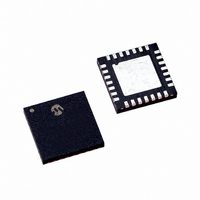PIC24FJ16GA002-E/ML Microchip Technology, PIC24FJ16GA002-E/ML Datasheet - Page 221

PIC24FJ16GA002-E/ML
Manufacturer Part Number
PIC24FJ16GA002-E/ML
Description
IC PIC MCU FLASH 16K 28-QFN
Manufacturer
Microchip Technology
Series
PIC® 24Fr
Datasheets
1.PIC24FJ16GA002-ISS.pdf
(52 pages)
2.PIC24FJ16GA002-ISS.pdf
(268 pages)
3.PIC24FJ16GA002-ISS.pdf
(22 pages)
4.PIC24FJ64GA004-EPT.pdf
(262 pages)
Specifications of PIC24FJ16GA002-E/ML
Program Memory Type
FLASH
Program Memory Size
16KB (5.5K x 24)
Package / Case
28-VQFN Exposed Pad, 28-HVQFN, 28-SQFN, 28-DHVQFN
Core Processor
PIC
Core Size
16-Bit
Speed
32MHz
Connectivity
I²C, PMP, SPI, UART/USART
Peripherals
Brown-out Detect/Reset, LVD, POR, PWM, WDT
Number Of I /o
21
Ram Size
4K x 8
Voltage - Supply (vcc/vdd)
2 V ~ 3.6 V
Data Converters
A/D 10x10b
Oscillator Type
Internal
Operating Temperature
-40°C ~ 125°C
Processor Series
PIC24FJ
Core
PIC
Data Bus Width
16 bit
Data Ram Size
4 KB
Interface Type
I2C, IrDA, SPI, UART
Maximum Clock Frequency
32 MHz
Number Of Programmable I/os
21
Number Of Timers
5
Maximum Operating Temperature
+ 125 C
Mounting Style
SMD/SMT
3rd Party Development Tools
52713-733, 52714-737, 53276-922, EWDSPIC
Development Tools By Supplier
PG164130, DV164035, DV244005, DV164005, PG164120, DM240011, MA240013, AC164127, DM300027, DV164033, DM240002
Minimum Operating Temperature
- 40 C
On-chip Adc
10 bit, 10 Channel
Lead Free Status / RoHS Status
Lead free / RoHS Compliant
For Use With
DM240011 - KIT STARTER MPLAB FOR PIC24F MCUAC162088 - HEADER MPLAB ICD2 24FJ64GA004 28AC164336 - MODULE SOCKET FOR PM3 28/44QFNDV164033 - KIT START EXPLORER 16 MPLAB ICD2
Eeprom Size
-
Lead Free Status / Rohs Status
Lead free / RoHS Compliant
Available stocks
Company
Part Number
Manufacturer
Quantity
Price
Company:
Part Number:
PIC24FJ16GA002-E/ML
Manufacturer:
Microchip Technology
Quantity:
135
Part Number:
PIC24FJ16GA002-E/ML
Manufacturer:
MICROCHIP/微芯
Quantity:
20 000
26.0
The PIC24F instruction set adds many enhancements
to the previous PIC
taining an easy migration from previous PIC MCU
instruction sets. Most instructions are a single program
memory word. Only three instructions require two
program memory locations.
Each single-word instruction is a 24-bit word divided
into an 8-bit opcode, which specifies the instruction
type and one or more operands, which further specify
the operation of the instruction. The instruction set is
highly orthogonal and is grouped into four basic
categories:
• Word or byte-oriented operations
• Bit-oriented operations
• Literal operations
• Control operations
Table 26-1 shows the general symbols used in
describing the instructions. The PIC24F instruction set
summary in Table 26-2 lists all the instructions, along
with the status flags affected by each instruction.
Most word or byte-oriented W register instructions
(including
operands:
• The first source operand which is typically a
• The second source operand which is typically a
• The destination of the result which is typically a
However, word or byte-oriented file register instructions
have two operands:
• The file register specified by the value ‘f’
• The destination, which could either be the file
Most
rotate/shift instructions) have two operands:
• The W register (with or without an address
• The bit in the W register or file register
2010 Microchip Technology Inc.
Note:
register ‘Wb’ without any address modifier
register ‘Ws’ with or without an address modifier
register ‘Wd’ with or without an address modifier
register ‘f’ or the W0 register, which is denoted as
‘WREG’
modifier) or file register (specified by the value of
‘Ws’ or ‘f’)
(specified by a literal value or indirectly by the
contents of register ‘Wb’)
bit-oriented
INSTRUCTION SET SUMMARY
This chapter is a brief summary of the
PIC24F instruction set architecture, and is
not intended to be a comprehensive
reference source.
barrel
®
shift
MCU instruction sets, while main-
instructions
instructions)
(including
have
simple
three
PIC24FJ64GA004 FAMILY
The literal instructions that involve data movement may
use some of the following operands:
• A literal value to be loaded into a W register or file
• The W register or file register where the literal
However, literal instructions that involve arithmetic or
logical operations use some of the following operands:
• The first source operand which is a register ‘Wb’
• The second source operand which is a literal
• The destination of the result (only if not the same
The control instructions may use some of the following
operands:
• A program memory address
• The mode of the table read and table write
All instructions are a single word, except for certain
double-word instructions, which were made dou-
ble-word instructions so that all the required informa-
tion is available in these 48 bits. In the second word, the
8 MSbs are ‘0’s. If this second word is executed as an
instruction (by itself), it will execute as a NOP.
Most single-word instructions are executed in a single
instruction cycle, unless a conditional test is true or the
program counter is changed as a result of the instruc-
tion. In these cases, the execution takes two instruction
cycles, with the additional instruction cycle(s) executed
as a NOP. Notable exceptions are the BRA (uncondi-
tional/computed branch), indirect CALL/GOTO, all table
reads and writes, and RETURN/RETFIE instructions,
which are single-word instructions but take two or three
cycles.
Certain instructions that involve skipping over the sub-
sequent instruction require either two or three cycles if
the skip is performed, depending on whether the
instruction being skipped is a single-word or two-word
instruction. Moreover, double-word moves require two
cycles. The double-word instructions execute in two
instruction cycles.
register (specified by the value of ‘k’)
value is to be loaded (specified by ‘Wb’ or ‘f’)
without any address modifier
value
as the first source operand) which is typically a
register ‘Wd’ with or without an address modifier
instructions
DS39881D-page 221













